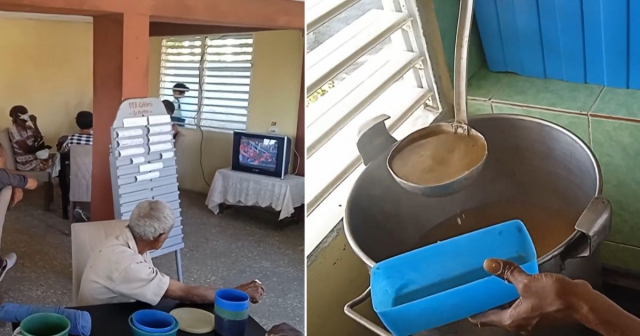Cuban elderly with the status of ex-combatants for their participation in the war ofAngola They survive on the streets of Cuba, neglected by the authorities of the regime.
“Older people, former combatants, tell how after fighting for the revolution, now the government has them helpless,” denounced theCuban Observatory of Human Rights (OCDH) in your X account.
A video shared in his publication showed the situation in which two of these elderly people live poorly, homeless, on the street and without a pension that allows them to live with dignity.Both are dedicated to collecting cans in the garbage and streets to sell them and be able to eat something..
One of them, 68 years old, showed the bags with cans that he collects and reported that he was homeless and did not receive care from social services.
The other, a resident of the Minas municipality, in Camagüey, said that he had gone to Angola in 1989, when his daughter was four months old. “I was practically forced, because if I didn't go it was a problem,” he acknowledged.
“But when I turned around they didn't give me anything, not even a combatant's pension. And I'm sick, look how my feet are,” he said, showing his swollen legs. “I survive by selling cans and eating what I can.”
The situation of former combatants in Cuba has been denounced on countless occasions, sinceThey are counted in thousands Cubans who participated in wars and other missions in Africa, and today survive poorly without a pension that allows them to live with dignity.
In “Operation Carlota” (Cuban missions in Angola), according to official figures from Havana, they were involved for 16 years (until 1991)377,033 military personnel and more than 50,000 civil collaborators.
According toCuba Archive, the communist regime did not act out of pure revolutionary solidarity, since it received payment for its services, estimated between US$300 and US$600 million annually (which would mean $4.8 to $9.6 billion dollars in 16 years of competition).
A source cited in areport From this organization he obtained confidential testimony from a former FAR officer, indicating that Angola paid about $2,000 per month per Cuban soldier.
In late July the news became known of an elderly ex-combatant from the Angolan and Ethiopian wars whosurvives by eating leftovers he finds on the streets of the Holguín province.
The man, identified asJulián Hidalgo Expósito, he told the independent portalCubanet who sometimes goes up to three days without eating, and when hunger is so strong he eats whatever he finds: "I know that if I eat from the floor I get sick, but it is worse to die of hunger," he says.
In February, a Cuban historiandenounced the abandonment suffered by former combatants in Villa Clara and assured that there are not even flower wreaths for their wakes in funeral homes.
A month earlier, a Rebel Army fighter and founder of the PCC from the province of Holguíndenounced the abandonment of the local government of the municipality of Antilla given his delicate state of health, according to a video shared on social networks.
“What I want to say is that I have been dedicated to the principles of socialism for 70 years and look how I am, I can't. There are all my medals. It's not easy, 70 years!!! Rebel Army fighter and they don't serve us. Antilla does not serve anyone,” he explains.Rigoberto Sarmiento Guerrero in a video broadcast byCubanet.
The Castro regime fears retired military personnel, for "our combat record and moral influence among active officers; and it is time to raise our voice in defense of the people and our former comrades in arms," a statement from the Conscientious Objector Military Movement stressed at the end of April.
"While the Cuban people and former military personnel suffer all kinds of deprivation, the Castros, their family and the ruling leadership live like millionaires," indicated the text, signed among others by Brigadier General (r)Rafael del Pino Díaz.
What do you think?
SEE COMMENTS (5)Filed in:
